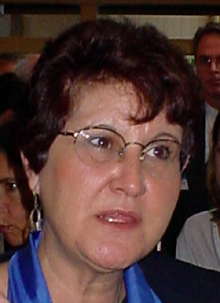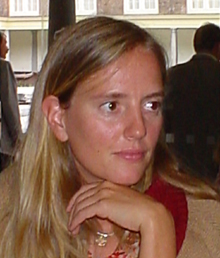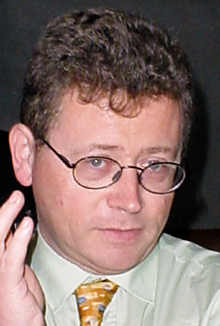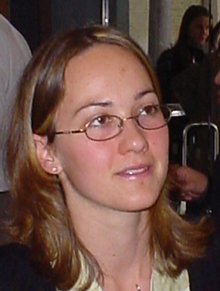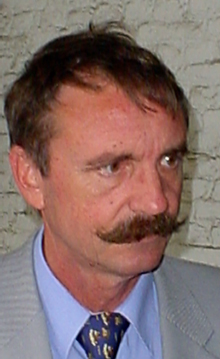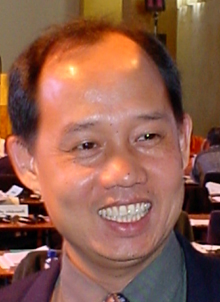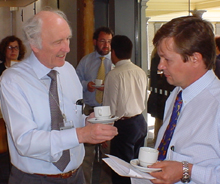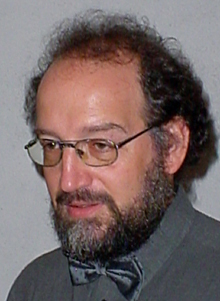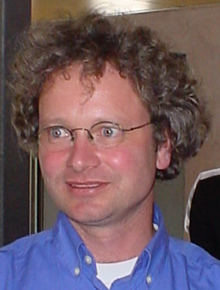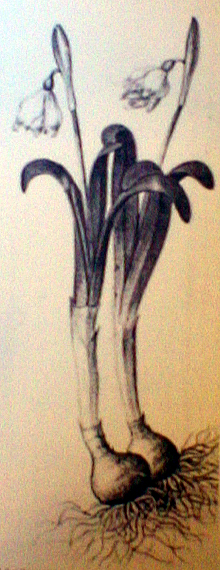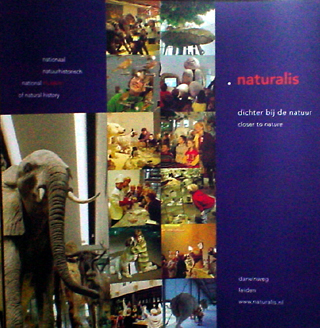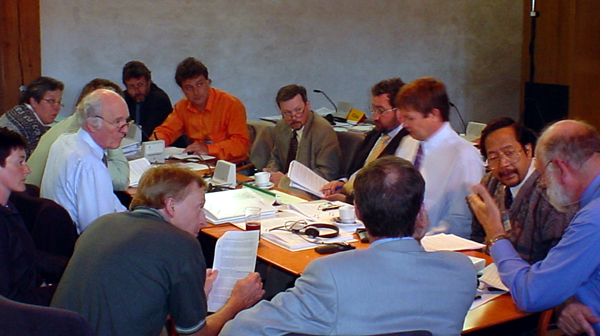|
|
There was no formal meeting of the Plants Committee on Wednesday,
15 May
Participants visited the Amsterdam Flower auction and nursery facilities
during an all-day excursion
Participants
met in morning and afternoon sessions at Naturalis, the natural history
museum in Leiden, to discuss: the follow-up of COP-11 Decisions on Devil's
Claw (Harpagophytum) and efforts of the mahogany working group;
species proposals for COP-12; significant trade in plants; and medicinal
plants.
FOLLOW-UP OF COP-11 DECISIONS:
Harpagophytum: Starting the morning session, Domitilla Raimondo,
National Botanical Institute, South Africa, presented on the status
of trade and management of Devil's Claw (Harpagophytum spp.),
perennial creeping herbs in southern Africa. She said these savannah
grassland plants have been traditionally harvested, mainly in communal
areas, and are used to treats arthritis, rheumatism and other aliments.
She reported that Namibia is currently the main exporter with 92% of
trade, while Botswana has 5% and South Africa has 3% of trade. She added
that Namibia and Botswana oppose an Appendix II listing because of the
income local people derive from the trade, although Botswana believes
an Appendix III listing could help with gathering trade figures, and
that South Africa will follow the recommendations of Namibia and Botswana.
 Listen
to the RealAudio extract of the presentation Listen
to the RealAudio extract of the presentation
Berit Hachfeld, Institute of Botany, University of Hamburg, Germany,
presented her research in Namibia and South Africa on the occurrence
and density of Harpagophytum procumbens, used in medicinal trade.
She said that Harpagophytum is restricted to sandy habitats in
savannah ecosystems with 150-500mm rainfall, but is not evenly distributed
throughout its range in southern Africa. Noting that Harpagophytum
tends to occur in overgrazed areas with low grass coverage, she stressed
it is necessary to research surrounding vegetation and land use systems
when considering Harpagophytum issues.
 Listen
to the RealAudio extract of the presentation Listen
to the RealAudio extract of the presentation
The regional representative for Africa introduced the common statement
by participants at the Regional Devil's Claw Conference (PC12/Doc. 8.1.1),
held in Windhoek, Namibia on 28 February 2002. He said that the conference
highlighted stakeholder and regional collaboration as necessary for
sustainable development and trade of Devil's Claw. He noted that some
participants expressed opposition to a potential CITES listing as it
could decrease trade and have negative impact on poor, rural communities.
 Listen
to the RealAudio Listen
to the RealAudio
During discussion, the UK and others noted that CITES has a public relations
problem in southern Africa, but an Appendix III listing could be beneficial
to range States. Oceania emphasized the need for more monitoring. Germany
stressed links with importers and traders to overcome lack of trade
information. The Secretariat added that monitoring is more important
than intensive ecological research and that CITES can play an important
role in addressing non CITES-listed species. He added that there is
a need to further develop documentation, which explains the role of
an Appendix III listing. IWMC-CH said a species listing could be interpreted
as leading to prohibition and suggested that the Plants Committee recommend
export quotas at COP-12.
Chair Clemente suggested that the next Plants Committee meeting be held
in southern Africa to try and change some of the negative views held
about CITES and CITES listings. She said the Plants Committee would
prepare a report for COP-12, which will include the discussed recommendations.
Mahogany (Swietenia) Working Group: The Secretariat highlighted
the outcome of the working group, which met in Santa Cruz, Bolivia from
3-5 October 2001. The meeting addressed national reports from range
States, as well as a report from TRAFFIC, and agreed that listing an
Appendix III listing was a positive move to regulate trade. He said
a final report is being prepared and would be sent to COP-12.
SPECIES PROPOSALS FOR COP-12:
Trade in seeds: Referring to the document it prepared (PC12/Doc.
9.2), the US noted confusion over the application of Resolution Conf.
11.11 (Regulation of trade in plants), in particular the definition
of artificially propagated specimens grown from wild-collected seeds
of Appendix II species. He suggested that because the parental stocks
are kept in the wild, the specimens are not artificially propagated.
The Secretariat responded that a plant is determined to be artificially
propagated if it is grown under controlled conditions, regardless of
whether it is from wild-collected or artificially propagated seeds.
The US referenced a decision regarding animals bred in captivity to
illustrate his point regarding artificially propagated plant species,
and suggested that possible solutions might be adding a definition of
"artificially propagated" for plants derived from wild-collected seeds
or other material, or designating such plants as being "cultivated."
IWMC-CH said different definitions of the same term should not be created,
and that artificially propagated plants cannot be compared with animals
bred in captivity.
The Secretariat advised: discussing the matter informally with interested
Parties; forwarding the issue to COP-12 as necessary; and undertaking
a general re-writing process of unclear resolutions on plants. The UK
suggested that simple implementation guides and case studies would assist
in clarifying resolutions. The Committee agreed to include clarification
and revision of the resolutions in the work plan.
Artificially propagated orchid hybrids: The US presented a document
(PC12/Doc. 10.1) resulting from efforts of a working group at the 11th
Plants Committee meeting (PC-11) on the proposed exemption of artificially
propagated orchid hybrids of the genera Cattleya, Cymbidium,
Dendrobium, Oncidium, Phalaenopsis and Vanda. He said
that, as these orchids are mass-produced "manufactured plants," there
is no impact on wild species, but there is concern about enforcement
issues. He suggested further consider by the Committee, noting that
the vast majority of traded orchids are artificially propagated. During
discussion, several participants agreed on the need to find a way to
remove the "ballast" of having hybrids on Appendices as it burdens Management
and Scientific Authorities and detracts attention from wild species.
Participants raised the issue of large container shipments, with suggestions
including more thorough identification of merchandise, country-of-origin
Management Authority certification of hybrids, and verification of uniformity
of container contents. Parties and regional groups, including Europe,
Oceania, North America and Asia, supported the US in pursuing the proposal
for presentation at COP-12.
Cactaceae: Based on lack of international trade and ease
of species identification, Switzerland proposed deleting from Appendix
II all Cactaceae species of subfamily Opuntioideae and all species of
leaf-bearing cacti, sub-family Pereskioideae (genus Pereskiopsis
and Quiabentia). These proposals (PC11/Doc. 10.1.1) were originally
presented at PC-11. The Secretariat notified Parties in March 2002 of
Switzerland's intention to consult with range States on this issue.
Discussion by range States focused on lack of adequate trade data and
objections to delisting. Mexico urged a precautionary approach, noted
their document on updated taxonomy of Opuntia (PC12/Doc. 14.2),
announced that they will host a meeting on 30 May 2002 on Opuntia,
and invited Switzerland to withdraw their proposal. Austria questioned
whether enforcement agents could identify the two proposed groups and
separate them from other cacti. The US said they may have difficulty
supporting Switzerland's proposal, noting that 50-75 % of cacti seizures
from 1998-2000 were Opuntia. The Secretariat and Chair urged
Parties to submit feedback on Switzerland's proposal. As recommended
by participants, Switzerland intends to revise the proposal based on
discussions and input from range States and submit it for consideration
at COP-12.
Araucaria araucana: Chair Clemente inquired about the
status of Argentina's Araucaria araucana proposal. The Secretariat
said that the postal vote had failed due to lack of a quorum and that
the issue will be forwarded for COP-12 consideration. The vote was called
because of the Philippine's rejection of the proposal. The Chair added
that although the IUCN and FAO said there was no data showing the occurrence
of Araucaria in the Philippines, it was still the country's right
to reject any such proposal for whatever reason. Nevertheless, there
were calls to support Argentina's proposal to list remaining Araucaria
on Appendix I. IWMC-CH said Argentina needs to decide if they will forward
a new proposal so that Parties have time to provide the Secretariat
with additional comments. Chile urged Parties and observers to make
comments on this subject and to support Argentina.
 Listen
to the RealAudio Listen
to the RealAudio
SIGNIFICANT TRADE IN PLANTS:
Problems and inconsistencies in Resolution Conf. 8.9 (Rev.) and Decision
11.117: This topic was discussed in an informal working group and
in Plenary on Tuesday, 14 May. Bertrand von Arx, working group Chair,
reported on the outcomes of the discussion on problems and inconsistencies
in Resolution Conf. 8.9 (Rev.) and Decision 11.117 (PC12/Doc. 11.1 (Rev.1)
Annex 3). The aim of the working group was to clarify and simplify the
significant trade review process for Appendix II flora. Delegates agreed
to several minor changes to the text, as well as the need to define
recommendation deadlines to facilitate implementation. The Secretariat
said an explanation of additional text was needed on the application
of adaptive management procedures for the formulation of recommendations
and their transmission to range States.
 Listen
to the RealAudio Listen
to the RealAudio
Implementation of Resolution Conf. 8.9 (Rev.): Trade in
plants from Madagascar: The UK, coordinator of the Madagascar
significant trade review process (PC12/Doc. 11.2.1), said that they
have been examining trade data and investigating what is available in
nurseries and over the Internet, which is to be given to the Madagascar
Management Authorities. He said the next stage is to convene a workshop
in Madagascar, but due to the domestic political situation, it has been
impossible. The Secretariat added that they have been unable to send
a CITES mission to Madagascar, and are awaiting a statement from the
Madagascar UN mission in order to implement a six-month trade moratorium
announced by Madagascar at the 18th meeting of the Animals Committee
in April 2002.
Cycads: The Secretariat announced that the funding for
the study on cycads was largely consumed by the Madagascar significant
trade review project, and that commencement of the study was pending
the instatement of the new Senior Scientific Officer (Flora) at the
Secretariat. He expressed hope that the process would begin by the end
of 2002.
Selection of taxa for review: The Secretariat explained that a list
of species of concern was prepared by a working group at PC-11 in September
2001. Since then, the Secretariat has examined trade data and prepared
suggestions regarding what species might be candidates for significant
trade review (PC12/Doc. 11.2.3). Africa pointed out that the reference
to Aloe ellenbeckii was misreported, the reported volume of 70,000
tons was of concern, and certain species had been omitted from the list.
The UK urged that a study be conducted on global trade of Pericopsis.
Mexico asked for clarification regarding the criteria by which species
were deemed to be of concern. The European Commission said that
it might be possible to use
their
contract with UNEP-WCMC to carry out the work on this task. He also
said that no decision had been taken yet to fund projects for
2003
and it was not
their
practice to solicit funding proposals.
Noting the lack of funding for reviews, the Secretariat advised that
the number of species examined under the significant trade review process
be limited in order to ensure quality results in terms of improving
long-term management in range States. He said external funds could be
sought to overcome resource constraints.
MEDICINAL PLANTS:
Inventory of medicinal artificial propagation operations: The
Secretariat presented on implementation of COP-11 Decision 11.165 to
inventory operations that artificially propagate species for medicinal
purposes (PC12/Doc. 12.1.1). He stressed the enormous amount of work
that this entails and requested the Plants Committee to help the Secretariat
identify the conservation benefit of this inventory process. He reported
that this issue was discussed with the Standing Committee, which agreed
it is a low priority as its purpose is unclear. Alternatively, he said
the Committee could consider recommending to COP-12 that Management
Authorities initiate a national-level inventory of operations in their
own countries. Austria supported this proposal and suggested working
with the Convention on Biological Diversity's Global Biodiversity Information
Facility, which may already have gathered relevant information. The
EU recalled that UNEP-WCMC data was often speculative about whether
species were exploited specifically for medicine or whether the medicinal
use was a by-product of other use. The Chair concluded the Secretariat
would prepare a document for COP-12 based on the discussion, and urged
that further COP decisions consider the resources needed to complete
recommended work.
List of species traded for medicinal purposes: The Secretariat
said this element of COP-11 Decision 11.165: is a considerable challenge;
depends on how medicinal purposes is defined and whether a species is
traded internationally specifically for medicinal purposes, and is not
a high priority. Several participants supported the Secretariat's concern
over resources necessary to undertake this task and questioned the original
objectives of the Decision, urging that future COP agreements should
be feasible and have defined objectives. The Chair suggested the Secretariat
note for COP-12 the challenges of this decision. Italy introduced their
information document (PC12/Doc. 12.1.3) on trade of medicinal plants
growing in Italy as part of the implementation of Decision 11.165.
|


